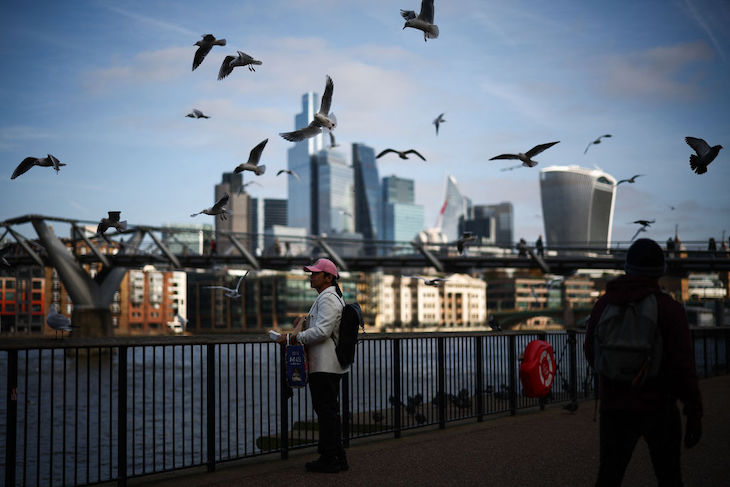The UK economy has grown for the first time in three months. The Office for National Statistics (ONS) reports that the economy expanded by 0.1 per cent in November after it contracted by 0.1 per cent in both September and October. This uptick is largely thanks to an increase in services output, which grew by 0.1 per cent in November 2024, after falling by 0.1 per cent in October (a downward revision from last month’s estimate that there had been no growth.
So has the economy turned a corner? It’s very difficult to spin this morning’s news in a wholly positive light. Yes, it’s good that the economy did not contract again, but November’s numbers are simply more evidence of a stagnant economy. For months now, headline GDP has basically hovered around zero, sometimes on the right or wrong side of that line: as the ONS reports this morning, GDP is ‘estimated to have shown no growth in the three months to November 2024, compared with the three months to August 2024’. This is all assuming November’s figures aren’t revised downwards next month; the smallest change would be the difference between growth and contraction.
There is rising concern that, despite technical growth, the possibility of a mild recession is growing. Capital Economics reports this morning that the ‘smaller-than-expected’ rebound (markets had expected 0.2 per cent), suggest ‘the economy has a bit less momentum than we previously thought and there remains a risk that the economy contracted in Q4 as a whole.’ Economist Julian Jessop (who was on Spectator TV last week to talk about rising borrowing costs), says after crunching the numbers, ‘the best we can hope for is that GDP was flat in Q4 as a whole…in terms of GDP per head, the UK is surely back in recession.’
It seems the government knows better than to claim today’s figures are a win. ‘I’m determined to go further and faster to kickstart economic growth,’ the Chancellor said in response to the figures.. ‘I will fight every day to deliver that growth and put more money into working people’s pockets’ – a recognition that what is being generated right now could hardly be described as a game-changer.
This is similar to the uncomfortable territory the Conservative government had to navigate in 2023, when month after month the UK's economy hovered on the verge of a technical recession. It’s a sign of stagnation: whether it’s slim growth or a small contraction, the balance on the whole is a sluggish economy that shows no signs of taking off.
This remains a serious problem for the government, not simply because ministers have been making lofty promises about growth for six months now, with nothing to show for it. But the far more concerning factor will be the impact of the Budget this year, when the measures start to take their toll on businesses and workers. The Office for Budget Responsibility has already calculated that the measures will see living standards rise at a slower pace compared to their forecast last March.
What might the Chancellor do to break the cycle of stagnation? ‘Reform’ is a word said on repeat by the government, though the important questions about the UK’s biggest institutions and programmes (the NHS, the state pension) go largely unaddressed. Today Reeves is speaking to a key set of stakeholders – the regulators – to ‘press’ them to help come up with some solutions. While there’s no doubt that pivoting to a smarter, more nimble regulatory process would help increase activity, that does not immediately appear to be the Chancellor’s goal; instead, she'll speak to the Environment Agency about creating more quango jobs. But whatever good might be done by urging regulators to take a slightly more nimble approach is likely to be cancelled out by expanding regulations elsewhere – particularly around employment – are likely to restrain growth further.








Comments